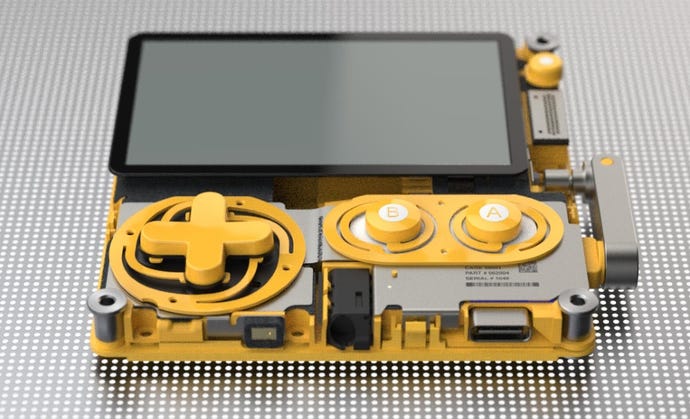PlayStation and Xbox are basically the same thing and it took a console with a crank to prove it
Firewatch publisher Panic has announced Playdate, a bright yellow handheld with a tiny black and white screen.
The console looks familiar enough at first glance, if nostalgic for a time of fewer controls - just a d-pad and two buttons on the front, like the Game Boy. But then you notice the... thing on its right-hand side. It’s a crank, the same device you might use to start up an old car, or to adjust the angle of a sail in the wind; a hipster-y addition that signals Playdate as a gently disruptive force in the console sphere.
The crank, like the 400x240 resolution and 2GB of storage, all but prevents ports from other platforms. It’s a daft prompt for new ideas, ensuring the games on Playdate will be a departure from the norm, something that could only exist between its yellow walls. It’s also a reversal of the trend towards homogeneity in consoles across the last two generations, to the point where it’s becoming difficult to tell them apart.
The contemporary console has ten buttons and two analogue sticks. You don’t need me to tell you precisely where they are - if you’re seen a controller in the last decade and a half, you already know. It connects to a television, where the colour display shoots for the sharpness and fidelity of PC hardware, and games are purchased from a download store or run from discs.
Xbox 360, Xbox One, PS4, PS5 - the description fits them all because nothing really changes. If you define your tribe according to Sony or Microsoft colours, have another look at exactly what it is you’re arguing over: platform exclusives. These companies have to pay developers for sole rights to release their games so that their machines are in any way distinguishable.
For too long we’ve relied solely on Nintendo for a touch of the unexpected - and even that prospect has faded. This generation, Nintendo’s experimental instincts have been reserved for sideshows like the cardboard Labo peripherals. The Switch, wonderful as it is, is the final form in a walk back from the out-and-out strangeness of the Wii. The echo of those motion sensor remotes can still be found in the Joy-Con, but for the most part Nintendo has settled for combining the contemporary console controller with the touchscreen of our phones - a hybrid approach designed to please everyone, rather than pitch sideways in a strange direction that might inspire new experiences.
Don’t get me wrong, there’s a lot of good that’s come with the unification of the major consoles. It’s enabled the rise of multi-platform games - the triple-A standardisation of simultaneous Xbox, PlayStation, and PC releases that allows developers access to wider audiences. That results in larger budgets and, as a result, more ambitious games. Cross-play is also a new and exciting feature that brings down the walls between consoles even more. Even Call of Duty is jumping on the cross-play bandwagon. But there’s likely no hardware surprise awaiting us at E3. Even the next major development of the industry - mainstream adoption of game streaming - has long been laid out before us. It’s a matter of when, not if.
Surprise is Playdate’s appeal. What you can’t see from looking at its cranky visage is that games won’t be picked from a store nor bought as cartridges. Instead, once a week, a little light on its roof will begin to glow to let you know that a new game has been beamed down from on high. It might be Crankin’s Time Travel Adventure, a Braid-like contribution from Katamari Damacy designer Keita Takahashi, or one of a number of secret games from indie luminaries like Bennett Foddy and Zach Gage. And you’ll discover it there and then.
More so than the crank, even, this aggressive curation feels like an overdue break from the norm. Anybody who’s ever complained about their Steam backlog knows that choice in entertainment can be paralysing, and that’s only going to become a greater problem as streaming produces the first takes on a gaming Netflix.
There’s magic in the prospect of being disconnected from the triple-A marketing machine, the user reviews, and the social media conversation about what you should be playing - instead just trying the game that’s placed on a platter in front of you, whatever the genre, and seeing how it makes you feel. It’s the equivalent of pushing away the menu and asking for the chef’s special. Paradoxically, there’s freedom in relinquishing control.
To preempt the comments: nobody outside Panic knows Playdate’s specs, because that’s not the point. It won’t rival the big consoles for power or install base, because it’s not supposed to. What it does do is highlight just how similar consoles have become.
Over 33,000 people have followed the Playdate account on Twitter precisely because it’s different. Panic has presented the devs of its first season of games with hard limitations to inspire new ideas, and encouraged us to consider stepping away from the omni-consoles for something less predictable. In that sense, however it sells, it’s succeeded in its mission already.




